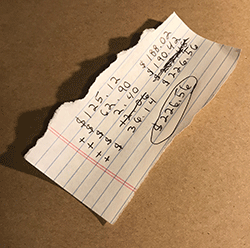Where Do I Get My Ideas?
/Where do I get my ideas?
The same place everybody else gets their ideas.
Ideas come from your interests and experiences, refracted through your own actively cultivated creativity. What I mean by this is that we all take in the world around us from our own unique perspective. We stockpile the things that most affect us. And then, if so inclined, express these things back in a distinctive and ideally fascinating approach that develops through practice.
People consume media of all types for a lot of reasons, but ultimately it is to experience someone else’s perspective on our existence. We read the newspapers to learn what is going on in the world and what others think about it. We watch old 70s police procedural TV shows to experience an exciting story and to let our mind play along with solving the big mystery. We listen to music for the emotion and poetry to be delighted by wordplay while getting insight into how another sees things.
The trick isn’t getting ideas, it is developing the instincts and practice to collect them well, evaluate them, and nurture the best into fully realized pieces. For a lot of people that comes with the requirement to take a lot of notes. Ideas, even bad ones – which will be most, are like quicksilver dodging and reversing through the mind until dissipating away. The practice is to capture a lot of ideas before they spirit themselves away. As you do this more and more, you’ll find most aren’t worth developing but try not to evaluate them at conception. The emotional rush, and then withdrawal, get in the way. Just capture it on paper, a computer file, or a voice recording. Judge its value later.
Thanks to smartphones, it has never been easier to jot down thoughts, grab images, or make voice notes. Whether it is an iPhone or Android device, your phone comes with the hardware and software to be a note-taking machine right out of the box. You just have to learn to use it and incorporate it into your routine.
Collecting ideas and the crazy, random thoughts inside your head habitually get you a stockpile of material to work through. Don’t throw out the bad ideas, just let them settle at the bottom of the heap. You’ll find that today’s stupid thought might lead to tomorrow’s next inspiration.













